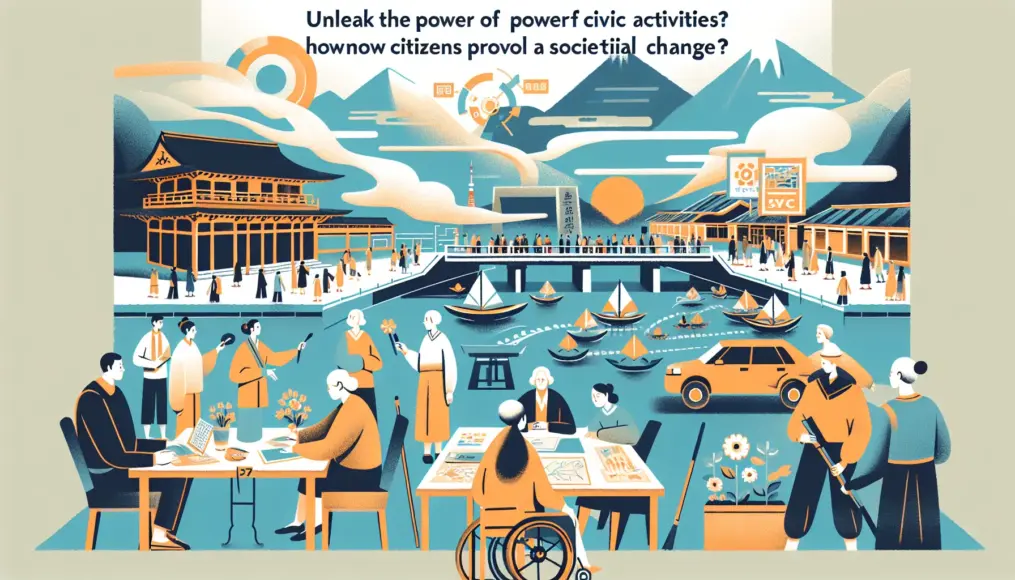Citizen engagement refers to the voluntary actions taken by individuals or groups to improve our society. It is a vital component that underpins democracy. When citizens voice their opinions and concerns, they possess the power to instigate social change.
In this article, we will delve into the essence of citizen engagement, explore its historical background, and examine its role in today’s world. Through successful case studies, we will see how these activities influence society. By participating in these efforts, each of us can contribute to creating a brighter future.
- Grasp the definition and historical context of citizen engagement
- Explore social impact through successful case studies
- Understand the role of citizen engagement in the modern digital era
What Is Civic Engagement? A Basic Understanding
Civic engagement refers to the actions we take as individuals to actively participate in society and drive change. This concept embodies the fundamental values of democracy, highlighting the importance of cooperation among individuals and groups to tackle social issues. Understanding civic engagement can inspire us to reflect on how we can influence our communities.
In this section, we will first clarify the definition of civic engagement, followed by an exploration of its historical background. By examining the origins and development of civic activities, we can better appreciate their role in contemporary society.
Definition of Civic Engagement
Civic engagement encompasses actions taken by ordinary citizens to contribute voluntarily to society. This includes a wide range of activities such as volunteering, local environmental initiatives, and political participation. The primary goal of civic engagement is to contribute to the betterment of society and to solve pressing issues.
Moreover, civic engagement serves as a means for individuals to express their opinions and voices. When citizens come together with a common purpose, they can wield significant influence. These activities play a crucial role in promoting transparency and democratic processes within society.
- Civic engagement is the voluntary action of ordinary citizens
- Aims to improve society and address social issues
- Functions as a means to amplify individual voices
Historical Background
The history of civic engagement is long-standing, dating back to ancient times. For example, in ancient Greece, the establishment of democracy emphasized the importance of citizen participation in politics. Over time, various social movements emerged, leading to the expansion of rights and the pursuit of social justice.
In modern times, particularly from the 19th to the 20th centuries, movements such as labor rights and civil rights gained momentum. These movements played a vital role in empowering citizens to assert their rights and influence society. Civic engagement has consistently contributed to societal change throughout history.
For those interested in deepening their understanding of civic engagement, we recommend reading this article: “Exploring the Behind-the-Scenes of Election Campaigns: Customs and Changes in Japanese Politics.” This piece provides a detailed look at the historical context of election campaigns in Japan and the various changes in modern times, offering valuable insights into how citizens can impact society through political participation.
- Civic engagement has a history that stretches back to ancient times
- In ancient Greece, citizen participation in politics was emphasized
- Since the 19th century, labor and civil rights movements have played a key role
The Impact of Civic Engagement on Society
Civic engagement plays a significant role in shaping our society. It contributes to solving local issues, improving policies, and even fostering new values. Understanding how proactive citizen actions can lead to positive societal changes is essential. In this section, we will explore real-life success stories that illustrate how civic engagement is transforming communities.
The impact of civic activities spans various fields. When individual efforts come together, they create a larger process of social transformation. Let’s delve into specific examples to see how such changes can occur in our immediate surroundings.
Highlighting Success Stories
Successful examples of civic engagement include community-driven environmental protection initiatives and movements aimed at addressing social inequalities. For instance, in one community, residents banded together to clean up a local park, significantly improving their environment. Such activities not only strengthen community bonds but also inspire others to join in, leading to even greater participation.
Additionally, there are instances where movements aimed at reducing social inequality have successfully proposed concrete measures to political leaders, resulting in improvements in laws and systems. This shows that civic engagement is not merely volunteer work; it possesses the power to effect real change in society.
- Successful examples of environmental protection efforts
- The impact of movements addressing social inequality
- Achievements of civic engagement influencing laws and systems
The Process of Social Transformation
The process through which civic engagement leads to social transformation typically unfolds in several stages. Initially, citizens who are aware of certain issues come together to set common goals. Through sharing information and discussions, they develop specific action plans. At this stage, it’s crucial for participants to collaborate while taking on distinct roles.
Next comes the implementation phase, which can manifest in various forms such as demonstrations, petition drives, or community events. Ultimately, as these activities gain momentum, they can influence a larger audience, potentially leading to changes in policies or laws. This entire process showcases the power that citizens hold in shaping society.
Exploring the impact of civic engagement also involves understanding its historical context and examples. The article “How Student Movements Sparked Political Change in Japan” delves into how student movements influenced political dynamics in Japan, providing valuable insights into the significance of civic engagement. If you’re interested, be sure to check it out!
- Activities initiated by citizens’ awareness of issues
- Formulating specific action plans
- Achieving transformation through widespread action
The Role of Civic Engagement in Modern Society
In today’s world, civic engagement plays an increasingly vital role. The evolution of digital technology has greatly expanded the ways in which citizens can share information and express their opinions. As a result, more people find it easier to participate in civic activities, leading to a heightened awareness of social issues. In this section, we’ll explore the characteristics of civic engagement in the digital age and its relationship with politics.
Civic engagement goes beyond mere volunteering or community service; it wields significant influence over society as a whole. By leveraging digital platforms, participants can connect across geographical boundaries, forming extensive networks. Let’s take a closer look at this phenomenon.
Civic Engagement in the Digital Age
With the advent of the digital era, civic engagement has reached a new stage. The widespread use of the internet and social media has made it possible to disseminate information quickly and broadly. This enables individuals and organizations to promote their activities with ease, drawing in a larger audience.
Moreover, online platforms have led to an increase in events and campaigns that citizens can participate in. As a result, diverse opinions and ideas can gather regardless of physical distance. Civic engagement utilizing digital tools is creating new forms that transcend traditional boundaries.
- How digital technology is transforming civic engagement
- The importance of information dissemination through the internet and social media
- The ease of participation due to the rise of online events
The Connection Between Civic Engagement and Politics
Civic engagement and politics are closely intertwined. When citizens express their opinions and take action, they can influence the political landscape. For example, gathering public sentiment on specific policies and advocating for them supports the healthy functioning of democracy.
Additionally, by focusing on political issues, civic engagement can raise societal awareness and encourage policy improvements. When citizens’ voices are reflected in political discourse, a broader range of values and needs can be integrated into decision-making. In this way, civic engagement possesses the power to drive political change.
- The impact of civic engagement on politics
- The significance of citizens’ voices in policy improvement
- The importance of reflecting diverse values in politics
Strategies for Successful Civic Engagement
To achieve success in civic engagement, having a clear strategy is essential. By setting well-defined objectives and goals, and planning accordingly, you can create more effective initiatives. Additionally, finding innovative approaches to attract participants is crucial. In this section, we will explore actionable plans for success and effective methods to encourage participation.
Civic engagement thrives on the collaboration of many individuals. Therefore, it’s imperative to strategically plan and create an environment that draws people in. By considering specific steps, you can enhance the feasibility of your initiatives and influence a larger audience.
Creating an Effective Action Plan
The first step in crafting an effective action plan is to clearly define the purpose of your initiative. What do you want to achieve? What issues do you aim to address? Once you have these questions answered, outline the steps necessary to reach your goals and identify the resources and personnel you’ll need.
Next, develop a schedule for executing your activities. Pinpointing the when, where, and what of your initiative will make your plans more attainable. It’s also important to regularly assess your progress and maintain the flexibility to adjust your plans as needed.
- Clearly define the purpose of your initiative
- Outline specific steps to achieve your goals
- Create a schedule to enhance feasibility
Encouraging Participation
To boost participation, you first need to convey the appeal of your initiative. Clearly explain its significance and the impact that participants can have by getting involved. This can help spark interest. Additionally, utilizing social media and local events to spread the word can be highly effective.
Creating a welcoming environment for participation is also key. By adjusting the content and schedule of your activities, you can make it easier for more people to join in. For instance, offering online participation options or flexible scheduling can encourage greater involvement. This way, participants can feel more comfortable engaging with your initiative.
When considering methods to promote participation in civic engagement, it’s also important to recognize the role of education in raising awareness about political issues. If you’re interested in exploring how civic education can foster participation, check out this article: “What is Education for Nurturing Future Sovereign Citizens?.”
- Clearly communicate the significance of your initiative
- Utilize social media and local events for outreach
- Create an accessible environment for participation
Conclusion
Civic engagement is a vital tool for improving our society. When individuals and organizations take initiative, they contribute to solving local issues and driving social change. The advent of the digital age has lowered the barriers to participation, allowing more people to get involved in civic activities. To be successful, it’s essential to set clear goals and create effective action plans.
Furthermore, civic engagement is closely linked to politics. When participants voice their opinions, these perspectives can influence policies, paving the way for a better society. Keeping these points in mind, each of us can help bring about transformative change by participating in civic activities.
- Civic engagement is a crucial means of addressing social issues
- Digital technology has made participation easier
- Clear goals and action plans are key to success
Civic engagement is a powerful way to enhance our society. We’d love to hear your thoughts and opinions in the comments!



Comment